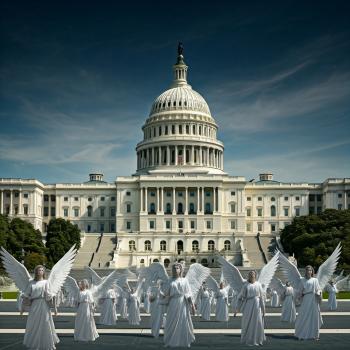Or, Tribulation is a force that gives us meaning.
Left Behind, pp. 418-421
Meanwhile, in the suburbs outside of Chicago, a warm, domestic scene with the remaining members of the Steele family. Newly converted Chloe Steele voraciously reads in her dear departed mother’s Bible and her father, immensely pleased, sits watching her. But not at all in a creepy way:
Rayford Steele was a happy as he had been since his own decision to receive Christ. To see Chloe smiling, to see her hungry to read Irene’s Bible, to be able to pray with her and talk about everything together was more than he had dreamed of. “One thing we need to do,” he said, “is to get you your own Bible. You’re going to wear that one out.”
“I want to join that core group of yours,” she said. “I want to get all that stuff from Bruce firsthand.”
Unlike her father, Chloe is at least able to stay awake while reading the Bible. We’re not told what it is, specifically, that she’s reading. Revelation, one assumes, and parts of Daniel but not the other parts. And little snippets from Ezekiel and Zechariah, the odd-numbered verses of Matthew 24, every third word in John’s second and third epistles, and carefully redacted chapter fragments from 1 & 2 Thessalonians. For premillennial dispensationalists, the rest is just padding that doesn’t apply to our “dispensation.”
The PMD prophecy enthusiasts really would “wear out” a Bible if they tried to read one the way they claim it should be read. All that tearing out and reshuffling and re-editing on the fly would be tough on the binding. It’s not really possible to pick up the physical book and read it this way. Even a Scofield Reference Bible, with its footnotes indicating all the arbitrary cross-references, would exceed the capacity of a ten-fingered reader to keep track of all the various and disparate passages it tries to stitch together as an allegedly single, secret narrative.
This is why the authors can tell us about Chloe hungrily reading the Bible, but they can’t get more specific. It’s also why Chloe herself realizes that she’ll never be able to understand the End Times Checklist simply from reading the Bible on her own — she needs Bruce’s help to read it with the PMD decoder ring.
The telling word here is “firsthand.” Bruce’s interpretive overlay — “all this stuff” — is the “firsthand,” primary source. The Bible is secondary at best.
It’s also strange here that Irene’s Bible seems to be regarded only as just another Bible. Here is an artifact of the wife and mother they have lost. It is a thing she treasured, that she held every day. Its margins are filled with notes in her own handwriting. My mother’s Bible is not like any of the other Bibles, or any of the other books, I own. it is not merely a sacred text, but a sacred edition. It’s impossible for me to read that volume without thinking of the hours my mother spent with it, of the prayers she prayed for me during the years she spent in those pages. To read that Bible is to have the sense, both sad and comforting, that I am somehow reading it with her.
So it’s just alien-seeming that Rayford and Chloe seem to be treating Irene’s Bible as indistinguishable from some Gideon edition pinched from a hotel room. It’s alien-seeming, too, that they can sit together in this house and not be reminded, constantly, of Irene and Raymie. Yet there’s no sense here of their presence or their absence.
I can’t help but think of John Irving’s Hotel New Hampshire when reading these scenes, and of the sadness that pervades that book due to the death of mother and poor Egg.1 The authors of Left Behind seem to think they’ve already dealt with that sadness, that this sorrow and loss could be dealt with in a scene or two, allowing their characters and their checklist plot to move forward without ever looking back. There’s never the sense here that sadness and loss linger. In Left Behind, sorrow doesn’t float.
“The only part that bothers me,” Chloe says as she wraps up her vague Bible study, “is that it sounds like things are going to get worse.”
That’s a major theme of LaHaye’s prophecy scheme: “Things are going to get worse.” This is the trajectory here in history — so anyone who says different, or who tries to make things different, is likely evil. And it’s even more the trajectory of the post-history “tribulation” period in which Chloe finds herself.
Late in the afternoon they dropped in on Bruce, who confirmed Chloe’s view. “I’m thrilled to welcome you into the family,” he said, “but you’re right. God’s people are in for dark days. Everybody is. I’ve been thinking and praying about what we’re supposed to do as a church between now and the Glorious Appearing.”
The “Glorious Appearing” is what LaHaye calls the Second Coming of Jesus. He can’t call it that because, in his way of seeing things, it’s really the third coming, with the Rapture being the second. PMDs have Jesus returning and re-returning to Earth so often that it’d make sense for him to spring for the EZ-Pass.
A pastor thinking about “what we’re supposed to do as a church” might not seem unusual, but for LaHaye-types it is. From their perspective, “what we’re supposed to do as a church” right now is wait for the Rapture, which could occur at any moment.
It could even happen … riiiiiight … now!
…
(Checks watch. Looks around.)
…
No? OK, maybe … wait for it … now!
…
Hmm, nope. OK, let’s try again. …
That pretty much is the PMD notion of the church’s business agenda between Christ’s ascension and the (first) second coming. There’s plenty, of course, that the church and its members shouldn’t be doing — dancing, drinking, sneaking peaks at Playboy like the pre-conversion Bruce Barnes did. As their truncated version of James 1:27 reads, “Religion that God our Father accepts as pure and faultless is this: … [snip] … to keep oneself from being polluted by the world.” The only thing they have to do besides sit around and wait for Jesus to come back is evangelism — which as far as they can figure means recruiting others to also, um, sit around and wait.2 Not terribly inspiring.
Bruce Barnes, however, knows that the second coming 2.1 won’t be happening at any second. He has some time to kill before the (second) second coming, so he has to figure out something for his flock to be doing for the next seven years. At least for those few who manage to live that long.
Chloe wanted to know all about that, so Bruce showed her from the Bible why he believed Christ would appear in seven years, at the end of the Tribulation. “Most Christians will be martyred or die from war, famine, plagues or earthquakes,” he said.
Chloe smiled. “This isn’t funny,” she said, “but maybe I should have thought of that before I signed on. You’re going to have trouble convincing people to join the cause with that in your sign-up brochure.”
Bruce grimaced. “Yes, but the alternative is worse. We all missed out the first time around. We could be in heaven right now if we’d listened to our loved ones. Dying a horrible death during this period is not my preference, but I’d sure rather do it this way than while I was still lost. Everyone else is in danger of death, too. The only difference is, we have one more way to die than they do.”
“As martyrs.”
“Right.”
Ooooh, martyrs! How exciting!
And here we come to the vicarious appeal of these books for American evangelicals. The perilous Tribulation that Bruce Barnes describes is frightening, yes, but at least it’s not as dull as the uninspiring sit-around-and-wait, do-nothing existence they’ve come to believe is their lot in life here in history.
Here in Left Behind they can reimagine the Christian life as an exciting adventure. It’s similar to the speakers we had on youth group retreats back in high school. They would tell these thrilling stories of Christians who were persecuted for their faith — first century believers or 20th-century Christians in China or behind the Iron Curtain. The stories would reach a crescendo where the persecuted faithful were forced to choose between denying their faith and certain death. “What would you do?” the speakers would ask. And then, with every head bowed and every eye closed, we were given the opportunity to come forward yet again to re-re-dedicate our lives to Christ.3
I don’t know whether those speakers realized the secret envy we had when listening to those stories. The lives of those martyrs seemed so much more exciting and meaningful than our own did. Plus there was something weirdly appealing about a one-time, one-question, pass-fail test in place of the tedious day-after-day. In our imaginations, at least, the martyr’s egress sounded almost easier than the pilgrim’s progress (as somebody once said, the hardest thing in this world is to live in it.) We imagined that, like the grandmother in Flannery O’Connor’s “A Good Man Is Hard to Find,” we could’ve been good kids if it had been somebody there to shoot us every minute of our lives.
This is something Christopher Hedges captures in his book War Is a Force That Gives Us Meaning:4
The eruption of conflict instantly reduces the headache and trivia of daily life. The communal march against an enemy generates a warm, unfamiliar bond with our neighbors, our community, our nation, wiping out unsettling undercurrents of alienation and dislocation. War, in times of malaise and desperation, is a potent distraction. …
War makes the world understandable, a black and white tableau of them and us. It suspends thought, especially self-critical thought. All bow before the supreme effort. We are one. Most of us willingly accept war as long as we can fold it into a belief system that paints the ensuing suffering as necessary for a higher good, for human beings seek not only happiness but also meaning. And tragically war is sometimes the most powerful way in human society to achieve meaning.
Which is quite similar to one of my favorite passages from Walker Percy’s The Last Gentleman:
What happens to a man to whom all things seem possible and every course of action open? Nothing of course. Except war. If a man lives in the sphere of the possible and waits for something to happen, what he is waiting for is war — or the end of the world.
The intended readers of Left Behind are waiting for the end of the world. Or for war. Either one would do. Either one would seem more meaningful than the headache and trivia of daily life that constitutes what they now think of as “discipleship.” And Left Behind lets them experience both, at least vicariously.
That sense of excitement, of how much more thrilling this would all be, can be seen in the next paragraph:
Rayford sat listening, aware of how his world had changed in such a short time. It had not been that long ago that he had been a respected pilot at the top of his profession, living a phony life, a shell of a man. Now here he was, talking secretly in the office of a local church with his daughter and a young pastor, trying to determine how they would survive seven years of tribulation following the Rapture of the church.5
The “phony … shell of a man” refers to Steele’s life before his conversion, but it’s hard not to think of the authors and their readers relating to that as a description of their own mundane lives when contrasted with the thrilling adventure of life as God’s guerrillas during the Tribulation.
Bruce tells the Steeles about a new core group he has decided to form (not to be confused with the original core group, of which Rayford is already a member):
“I’ve also been thinking about a smaller group within the core. I’m looking for people of unusual intelligence and courage. I don’t mean to disparage the sincerity of others in the church, especially those on the leadership team. But some of them are timid, some old, many infirm. I’ve been praying about sort of an inner circle of people who want to do more than just survive.”
Here they are, just nine days after the Rapture has caused them to start rebuilding the church from scratch, and already they’ve begun creating hierarchies and inner circles. Give them another week and they’ll break out the robes and funny hats.
“… It’s one thing to hide in here, studying, figuring out what’s going on so we can keep from being deceived. … But doesn’t part of you want to jump into the battle?”
Rayford was intrigued but not sure. Chloe was more eager. “A cause,” she said. “Something not just to die for but to live for.”
“Yes!”
“A group, a team, a force,” Chloe said.
“You’ve got it. A force.”
Chloe’s eyes were bright with interest. Rayford loved her youth and her eagerness to commit to a cause that to her was only hours old. “And what is it you call this period?” she asked.
“The Tribulation,” Bruce said.
“So your little group inside the group, a sort of Green Berets, would be your Tribulation force.”
“Tribulation Force,” Bruce said, looking at Rayford and rising to scribble it on his flip chart. “I like it.”
The authors’ only regret about this passage was that they couldn’t get Tyndale House to bind in pre-order cards for Left Behind II: Tribulation Force right here on this page.
Once you get beyond the overweening self-congratulation and general awfulness of that passage (take your time, I had to go out and run some errands and then come back to it), it’s interesting to note that Bruce and Chloe, in searching for “something not just to die for but to live for” settle on “a group, a team, a force” and not a cause, a purpose, a mission. Bruce attempts to imagine a cause or a mission that this “force” would be fighting for, but the best he can manage is to imagine what it would be fighting against:
“When it becomes obvious who the Antichrist is, the false prophet, the evil, counterfeit religion, we’ll have to oppose them, speak out against them.”
So again they aren’t for Christ, they’re anti-Antichrist, which again is far from the same thing. The former really could be “something to live for.” The latter might be something to die for, but more likely is merely something to kill for. That tends to be the problem when you define yourself in terms of what you’re against instead of what you’re for. That also tends to be the problem, as Hedges notes,6 with relying on war as your source for meaning.
The authors, fortunately, are only tangentially interested in giving readers something to kill for. Their main interest is just in supplying enough of the tantalizing possibility of such vicarious excitement that readers will go out to buy the sequel. And what was that sequel called again? Oh, right:
“You still want to be part of the Tribulation Force?”
Rayford nodded and smiled at his daughter’s firm reply. “I wouldn’t miss it.”
– – – – – – – – – – – –
1 So much so that I’ve come to picture a young Seth Green as Raymie. Jodie Foster as Chloe wouldn’t work, but Jodie as meta-Chloe would be perfect.
2 And, yes, thereby also to escape Hell. If what you’re being saved to seems pointless then what you’re being saved from has to be especially vivid. My favorite picture of Hell is the gray, isolating London of C.S. Lewis’ The Great Divorce. Lewis’ vision of Hell is difficult to distinguish from life in the church as envisioned by the PMD crowd.
3 Eventually I started keeping track of the number of times I had done this. It seemed absurd to me and I couldn’t help but think it would look the same to God. So I decided that I was done with that. No more re-re-re-dedications. This was considered bad form, since the pattern for these speakers was first to invite the unsaved to get saved, then to invite the already saved to re-dedicate themselves, then to continue gradually widening the invitation until everyone had left their seats and gathered down front. I was never fully able to convince my youth pastor that, for me, not going forward was more important, more meaningful, than doing so for the umpteenth time. He was deeply worried about me every time we had one of those altar calls and I wound up being one of only two people who didn’t go forward. (I never asked, and so never learned, what her story was.)
4 Thank you, Amanda, for getting me this. If book recommendations come on a scale from one to 10, consider this an 11: War Is a Force That Gives Us Meaning.
5 I’ve written before about one of my favorite movie plot formulas — the Innocent Man Embroiled in an International Scheme. Part of the appeal of that formula is something similar to what Hedges and Percy describe — crisis shatters, and thus enlivens and gives meaning to, the mundane. That paragraph about Rayford presents what is probably the most inept and least appealing variation of this formula that I’ve ever seen.
6 Seriously, go read War Is a Force That Gives Us Meaning.
















